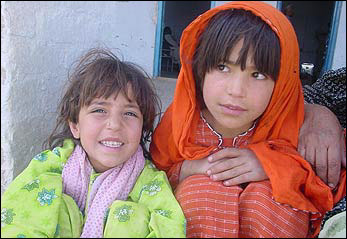Afghan returnees embrace hope amid uncertainties
Afghan returnees embrace hope amid uncertainties

Shakar, eight, wants to resume his studies in Afghanistan so that he can become a teacher.
QUETTA, Pakistan (UNHCR) - Eight-year-old Shakar Ullah looked like he had the weight of the world on his small shoulders as he sat on his family belongings on a loaded truck, waiting to return with his family to Ghazni in Afghanistan. He was deeply engrossed in thoughts of an uncertain future.
Asked how he felt about going home, he contemplated for a while, gazing at his veiled mother seated beside him. "Good," he decided. A student of class 4, the boy hopes to continue his studies in Ghazni. "I want to become a mualam [teacher]," he said.
His father explained, "Shakar aspires to become a teacher because in camps, teachers receive additional food items in exchange for their teaching services. Finding enough food to eat has always been a problem for our family throughout our refugee life."
The old man added, however, that he was not sure if he could find any schools back home for his son.
Shakar's family was one of the 499 being voluntarily repatriated to Afghanistan through Chaman from Baleli Voluntary Repatriation Centre (VRC) in Quetta, south-western Pakistan. An estimated 300 individuals have returned home daily from the VRC jointly run by UNHCR and the Pakistan government's Commission of Afghan Refugees (CAR).
Refugees wishing to go home register at pre-screening or registration centres before being sent to the VRC. This helps to control unexpected numbers of returnees who might appear at the VRC without any prior notice.
"We had to establish these registration centres after getting news of a large number of refugees appearing at a Peshawar repatriation centre," said Urooj Saifi, UNHCR's Repatriation Officer in Quetta. There are currently seven registration centres in the region.
Junaid Farooq, a registration official at Uzbek Bazaar Registration Centre, said people were thronging the centre by the hundreds. "At times we had 200 or 300 registrations," he said, adding that the office had applied a new rule asking the refugees to provide photos of all family members to avoid recycling or fraud. "This rule has kept a few refugees at a bay, as taking photographs of females is not considered traditionally good with Afghans," he noted.
UNHCR's officer-in-charge Codé Cissé told a press briefing recently that the percentage of the recyclers stood at 5 to 6 percent. The photo screening, however, has helped prevent these numbers from increasing.
As of late June, more than 93,000 Afghans comprising close to 18,500 families have been repatriated from Baluchistan province since the UNHCR-assisted repatriation initiative started in March.
Gul Babo heads one such family. Seated with daughters Zara and Salemo at Baleli VRC, she was waiting to head home for Karezat in Kandahar. Her husband has been missing for four years, but she was optimistic about finding him in Afghanistan and anxious to start cultivating their own land in Karezat.

Zara (left), five, and sister Salemo, six, waiting to go home to Kandahar.
Rabia Bibi, too, was excited about going home. Registering at the centre, she said it has been two years since she fled the heavy bombing in her village in Kandahar. The widow, who has six children, said, "My three sons are already in Kandahar rebuilding our ruined house in the village."
Many of the Afghan returnees in Quetta seemed well informed about current events in Afghanistan. Most said they received updates from relatives who visited the country frequently, while others said they relied on radio broadcasts. Yet others were eager to learn more about current happenings inside their homeland.
Some of the voluntary returnees wanted to be part of Afghanistan's reconstruction process that had begun after more than two decades of turmoil. Mohammad, a 55-year-old refugee at Uzbek Bazaar Registration Centre, had wanted to go home sooner, but "there was no guarantee to our safety and security. I was afraid".
Now was a good time, as he said with tears in his eyes, "I am going back to take part in rebuilding my country. We owe Afghanistan a great deal."
By Babar Baloch
UNHCR Pakistan







